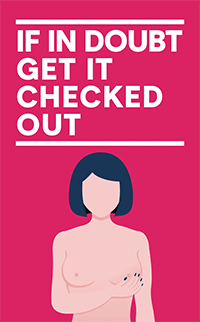You have returned to the top of the page.
How well do
you know
your breasts?
YOUR GUIDE TO BREAST AWARENESS
Detecting breast cancer early gives you the best possible chance of survival.
The earlier a lump is found, the more options you have for effective treatment.
Anyone can get breast cancer. Men and women. Young and old. So, every adult should be breast aware. Breast awareness is being familiar with the normal look and feel of your breasts, so that you can identify any unusual changes (such as a new lump).
PAY ATTENTION TO YOUR BREASTS
Early detection of breast cancer could save your life
1. LOOK
At your breasts
2. FEEL
your whole breast area
3. KNOW
The signs of breast cancer

It's important to check your breasts regularly.
Be breast aware —
Download our Breast Awareness Guide
INFORMATION ON BREAST SCREENING
It is important to remember that breast awareness does not replace having regular mammograms and other screening tests as recommended by your doctor. In order to detect breast cancer early, it is recommended that all women between 50-74 years attend regular screening mammograms every two years. These are offered for free by BreastScreen Australia. Women aged 40-49 and 75 years and older are also eligible for free mammograms if they choose to attend. In deciding whether to attend a screening mammogram, women in these age groups can speak with their doctor and should also consider the potential benefits and downsides of screening mammograms for them.
Some people diagnosed with breast cancer have described signs such as a lump or thickening in the breast, especially if it is only in one breast, changes to the shape or size of the breast or changes to the shape of the nipple. However, some women have no symptoms and the breast cancer is found during a screening mammogram.
If you have a strong family history or you are concerned that you may have an increased risk of breast cancer, talk to your GP or local family cancer clinic. Your doctor can help you assess and manage your breast cancer risk and will advise of any additional precautions or screening you may require.